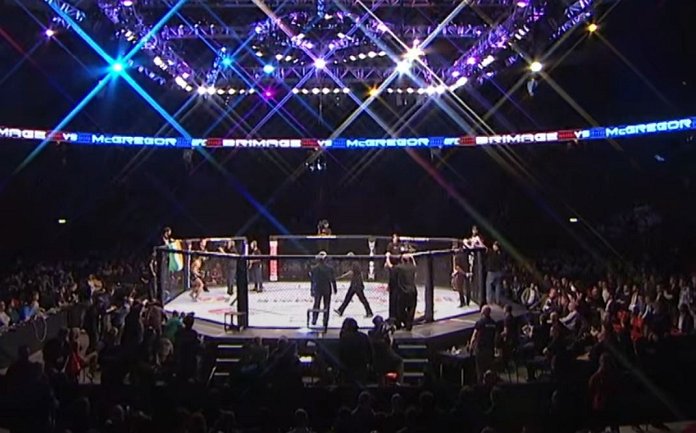
Nassourdine Imavov‘s victory over Jared Cannonier at UFC Louisville was overshadowed by controversy over referee Jason Herzog’s early stoppage, which many, including analyst Alan Jouban, felt was premature and deprived Cannonier of a fair chance to recover.
Nassourdine Imavov scored the biggest win of his career by defeating Jared Cannonier at UFC Louisville. Yet, his celebration was cut short as the focus quickly shifted to a controversial call by referee Jason Herzog.
Herzog stepped in and stopped the fight midway through the fourth round. Imavov was landing shots on a hurt Cannonier, aiming for a knockout, but Cannonier was still conscious and defending himself.
Cannonier protested immediately. The sold-out crowd in Kentucky erupted in boos.
Retired UFC veteran and current analyst Alan Jouban understands that fighters sometimes need protection from themselves. However, he believes Herzog’s intervention was unnecessary in this case.
“I do think he messed up on Saturday night,” Jouban said on the latest episode of The Fighter vs. The Writer. “I’d be curious to hear from [Herzog]. Sometimes you hear this: ‘I looked into Jared Cannonier’s eyes, his eyes were gone. They were glazed over, they were rolling into the back of the head. I talked to him, I said Jared show me something, Jared show me something. He didn’t show me something.’ That type of conversation — if I heard that from him, I would go, ‘OK, I wasn’t in there. I wasn’t standing three feet away from Jared,’ so he has a different perspective that we do. Sometimes that does happen. We’re not always right from what we see on TV from a zoomed out perspective.
“But in general, it was stopped too soon. It was stopped too early. Fighters need to be given the chance to fight out of something. What happens is you get hit sometimes and you get buzzed.”
Jouban explained that during his own UFC career, he would routinely inform referees to give him every possible chance to recover if he got rocked. He preferred officials to let the fight continue until the last possible second or until he was unconscious.
While he can’t say for certain what was said before UFC Louisville, Jouban knows fighters want ample time to recover, especially in situations like Cannonier’s.
Instead, Cannonier woke up Sunday with a knockout loss on his record. He knew beyond a shadow of a doubt that he wasn’t knocked out.
“I didn’t see him afford Cannonier the opportunity to fight out of it,” Jouban said. “It was an early stoppage. Maybe he would have ended it, maybe not, but Cannonier’s a guy, he’s in shape, these weren’t the type of shots that were like, ‘Oh my God, is he ever going to be the same?’ No, they weren’t those types of shots.
“Is he taking years off his life? No, he was buzzed. He was buzzed, and 30 seconds later he was completely coherent again. It was an early stoppage. Feel bad it happens. It’s a tough call to make in the moment, but that was not one of [Herzog’s] best refereeing in that matchup.”
Of course, Jouban understands that referees have an impossibly tough job requiring split-second decisions. Outside of egregious late stoppages like Jalin Turner vs. Bobby Green, Jouban prefers to give fighters every chance to escape bad spots.
While he appreciates fighter safety, Jouban laments how bad stoppages ruin fights. He hopes it doesn’t become a norm.
“We cannot let the UFC turn into the NFL,” Jouban said. “We cannot overly protect things. We cannot make it a completely different sport. You watch the hits and the tackles and the sacks in the NFL in the 80s and 90s and you look at it today and it’s a completely different sport. Now they’re trying to protect people. I get it, but this is combat sports. We’re a different sport. That is a game, this is a fight. We’re here to fight.
“We know every time we go out there, obviously we have the potential of getting knocked out or submitted or something could happen, but that is what people pay to see.”
Despite the NFL being the biggest sports league in the U.S., many players and fans complain about constant rule changes. Tackles once considered fair now earn penalties, altering games.
In particular, “roughing the passer” calls for quarterbacks have drawn significant criticism, especially from defensive players.
Jouban argues that fighters accept the risks of their careers. He hopes Herzog’s decision doesn’t set a trend.
“Fighters are fighting because they are OK with facing their fears and accepting that danger, accepting their fate,” Jouban said. “It’s OK if he lets it go 15 more seconds and Imavov lands a beautiful punch and Cannonier goes down and he’s knocked out. That’s OK. He’s not going to be mad [at Herzog].
“We’ve got to let these [fights] play out. We can’t start overly protecting fighters as they’ve done to overly protecting quarterbacks in [football]. This is combat sports. If this an amateur fight, stop it early. If this is your pro debut, stop it early. If this is the UFC and a main event in a sold-out arena, title implications, five-rounder — no, we go until somebody’s asleep.”